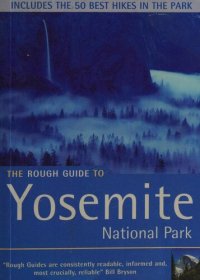
Ebook: The Rough Guide to Yosemite 1
Author: Paul Whitfield
- Series: Rough Guide Mini Guides
- Year: 2002
- Publisher: Rough Guides
- Language: English
- pdf
No temple made with hands can compare with the Yosemite. Every rock in its walls seems to glow with life. Some lean back in majestic repose; others, absolutely sheer or nearly so for thousands of feet, advance beyond their companions in thoughtful attitudes, giving welcome to storms and calms alike, seemingly aware, yet heedless, of everything going on about them.
John Muir, The Yosemite
More gushing adjectives have been thrown at YOSEMITE NATIONAL PARK than at any other part of California. But however excessive the hyperbole may seem, once youve seen the Parks stunning scenery with your own eyes you realize all this praise is actually an understatement.
Simply put, Yosemite Valley only a small part of the park but the one at which most of the verbiage is aimed is one of the most dramatic pieces of geology found anywhere in the world. Just seven miles long and one mile across at its widest point, the Valley is walled by near-vertical, three-thousand-foot cliffs whose sides are streaked by cascading waterfalls and whose tops, a variety of domes and pinnacles, form a jagged silhouette against the sky. This is where youll find some of the worlds most famous rocks Half Dome and rock climbings holy grail, El Capitan as well as Americas tallest waterfalls, with Yosemite Falls topping the lot. At ground level, too, the sights can be staggeringly impressive. Grassy meadows are framed by oak, cedar, maple, and pine trees, and are home to a variety of wildflowers and wildlife.
Elsewhere in the Park, the crisp alpine setting of Tuolumne Meadows (pronounced Too-ol-uh-me), perched close to Yosemites highest mountains on the Parks eastern border at 8600 feet, offers nature at its most peaceful and elemental. Here youve got easy access to the completely wild backcountry beyond, especially into the Cathedral Range, a place much favored by Yosemites environmental champion, John Muir, who was the first to scale the dramatically pointed Cathedral Peak.
As if that werent enough, the spectacle continues, from the glaciated canyons up in the north of the Park, all the way down to the southern reaches near Wawona, where Mariposa Grove encompasses one of the most awe-inspiring forests of giant sequoias found anywhere.
All of this wondrous scenery is within half a days drive of San Francisco and not much further from Los Angeles, so it is understandable that tourists are plentiful. Each year Yosemite has to cope with over three and a half million visitors, most of them intent on visiting Yosemite Valley, which in July and August (and any summer weekend) can get fairly packed. That said, the whole Park is massive enough to endure the crowds, and even places you can get to by car remain relatively serene most of the time.
Because of its size and sheer diversity of landscape, Yosemite National Park can be experienced on a variety of levels: many people just spend a day here doing a quick circuit of the top attractions, either by car or on one of the tours, and walking to the base of Yosemite and Bridalveil falls; others delve deeper over several days; and more than a few return frequently during their lifetime to photograph, explore, observe the wildlife, or just soak up the atmosphere.
Whatever your interests, be sure to spend some time hiking, even if its just around the Valley floor on one of the nearly-flat, paved trails. If youre willing to hike a few miles and perhaps camp out overnight, you can experience the 99 percent of Yosemite thats untouched by road. Its in this backcountry, too, that the best wildlife viewing opportunities occur, but even in the most populous areas it is possible to see deer, coyotes, and even black bears.